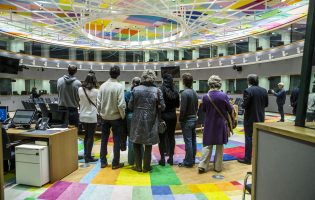Episode 115: The U.S. Election and Germany in Europe
The year 2025 will bring not only a new U.S. administration but also a new EU Commission. What will these changes mean for Germany and the United States, and what …

EU Cohesion Monitor 2019: The untold story of European resilience
The dominant narrative about the European Union over recent years has been one of fragmentation. Indeed, there are visible signs of a union struggling to mobilise collective action – on …
Has Merkel’s Power Peaked?
Angela Merkel is under pressure. For many years she has been a rock at Brussels’ conference tables dominated by sobering discussions on the economic and social outlook of EU member …
Playing the European Power Game
Germany, united: In 1989, the people of Berlin celebrated the collapse of the Berlin Wall after over 40 years of division. A breathtaking year later, Germany stood on the international stage as a unified country embarking on a new journey to rediscover and redefine its role in international relations.
Trying to Keep the Germans Close on EU Competences is Risky for Britain.
As German politicians discuss competences within the EU, the British media have characterized this as a positive response to London’s call to renegotiate the relationship between member states and the …
Queen Europa
Despite the ongoing electoral campaign and fiscal crisis, Berlin is “weirdly detached” during the summer break. In this commentary, AICGS Non-Resident Scholar Almut Möller discusses this phenomenon and the latest developments’ impact on the election.
The Arab Awakening One Year On: A European Perspective
In early 2011, the debate in the European Union about the repercussions of the Arab awakening that started in late 2010 and continues to this day was largely framed in …
Enhancing European Security
Europe will soon need to focus greater attention on its shared defense policy, an aspect that has been overlooked for quite some time. According to the authors, Germany must take the lead for such an initiative.
What the EU Did Next – A Compilation
While the recent general outlook on the future of the European Union has been filled with excessive doom and gloom, it is largely misplaced, writes Non-Resident Fellow Almut Möller in a collection titled “What the EU Did Next.” There is still hope for the EU, but significant work needs to be done; turning the EU from a liability into a solution will be a difficult task yet one that needs to be tackled. This volume of essays from the German Council on Foreign Relations (DGAP) focuses on the EU’s undervalued strengths and how these strengths can be used to revitalize parts of the EU agenda in an effort to refocus the EU for success in the future.





